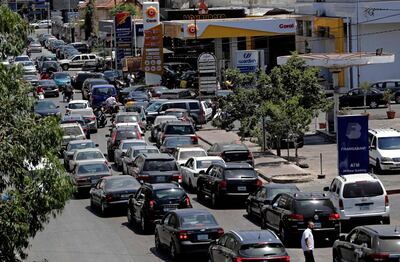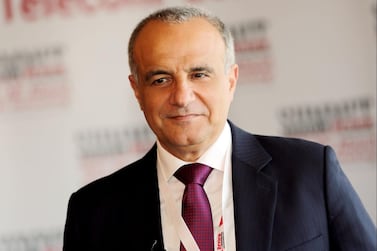Lebanon's pharmacists shut their shops for two days and protested alongside doctors in Beirut on Friday over shortages of medicines and medical equipment caused by the country's economic crisis.
Wearing their white coats, dozens of doctors and pharmacists demonstrated outside the Public Health Ministry.
They stormed the ministry in an attempt to meet Health Minister Hamaad Hasan but he refused to meet them, a doctor who took part in the protest told The National.
Ghassan Al Amine, who heads the Pharmacists Syndicate, told The National that in 50 years of practice, this was the first time he has had to go on strike.
“We lack basic, everyday drugs to treat chronic ailments such as diabetes, cholesterol, and heart disease. This is a disaster,” he said.
The private hospitals’ syndicate said on Thursday that dialysis treatments might be suspended next week because of a lack of medical supplies.
Lebanon's shortages, and the protests they have sparked, are the latest sign of a crumbling state in what was once a medical centre for the Middle East.

After a year and a half of severe economic crisis, Lebanese face shortages of basic necessities ranging from medicines to infant formula and fuel, most of which are imports that must be paid for in dollars.
The financial collapse, caused in large part by decades of economic mismanagement and corruption, leaves the central bank with dwindling foreign currency reserves. The value of the Lebanese pound has plummeted from the official peg of 1,507 to the US dollar at the start of the crisis to 15,000 on Friday.
Faced with shortages, rising prices, unemployment and poverty, and increased power failures, Lebanese have taken to setting up roadblocks to express their anger.
Activists and NGOs accuse Lebanese politicians of prolonging the crisis and making it worse by failing to implement the reforms necessary to access debt relief and loans from the international community.
The formation of a new government has been stalled by bickering over ministry allocations ever since the government led by Hassan Diab resigned after the devastating blast at Beirut port on August 4 last year.
Long queues at petrol stations are a common sight and the Lebanese have grown accustomed to visiting several pharmacies before they can find the medicines they need.
After waiting for an hour at a petrol station in Beirut, Mangala El Hindi, 50, told The National the country was facing its darkest days.
“I have just undergone surgery and yet I am forced to queue for petrol in this heat,” she said, opening her car door as she gasped for air.
“The situation is so bad, we are not living, we’re merely surviving.”







